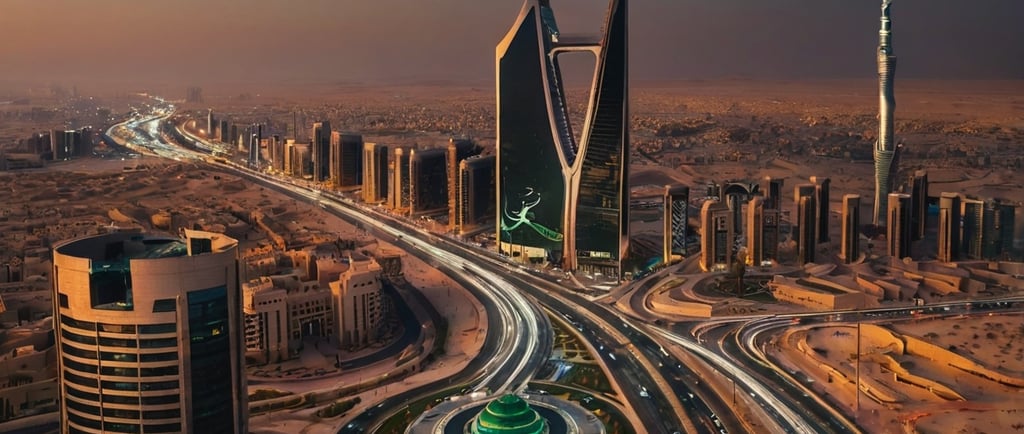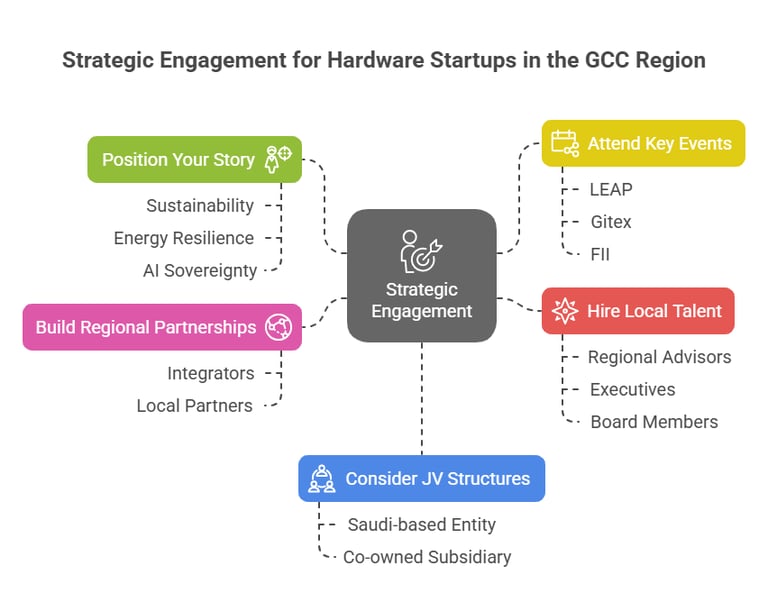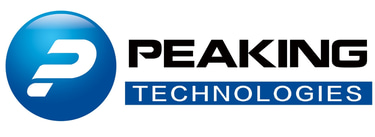Silicon Wadi Rising: Why Hardware Startups Should Pay Attention to Saudi Capital
A viral thread recently ignited interest across tech circles: former President Donald Trump reportedly walked out of Saudi Arabia with a $600 billion mega-deal, flanked by a who’s-who of Silicon Valley leaders.
5/16/20255 min read


Introduction: A Shift in the Global Innovation Landscape
In the past decade, hardware startups in the U.S. and beyond have faced a lopsided innovation economy. Venture capital, once flowing freely into wearables, robotics, and IoT devices, gradually shifted its weight toward software, platforms, and SaaS models that promise rapid returns and minimal physical risk. For hardware founders, this often meant longer fundraising cycles, higher upfront capital requirements, and a struggle to compete for investor attention.
But something is changing.
A viral thread recently ignited interest across tech circles: President Donald Trump reportedly walked out of Saudi Arabia with a $600 billion mega-deal, flanked by a who’s-who of Silicon Valley leaders. Though the accuracy of the numbers and Trump’s role is debated, the underlying truth is harder to ignore: Saudi Arabia is becoming a major player in the next wave of tech funding — and hardware startups may be among the biggest beneficiaries.
This is not about politics. It’s about capital flows, global partnerships, and the growing alignment between ambitious infrastructure projects and the deep-tech startups that can power them.
Let’s dive into why hardware founders should care — and what opportunities they might seize.
1. From Petrostate to Tech Stake: The Saudi Vision 2030 Context
Saudi Arabia's Vision 2030 is more than a national strategy; it's a $2 trillion transformation project. At its core is an effort to diversify the kingdom's economy away from oil and toward knowledge, tourism, sustainability, and high technology.
This transformation is backed by staggering capital:
Public Investment Fund (PIF): $700B+ in assets and growing
DataVolt: $20B pledged toward U.S.-based AI data centers and energy infrastructure
NEOM: A $500B smart city project featuring autonomous transport, drone delivery, and sustainable living
For hardware startups, this means a giant, hungry market for physical technology:
Robotics and autonomous vehicles for logistics and mobility
IoT sensors and edge devices for smart city infrastructure
Energy-efficient computing and thermal management systems for data centers
Drones, satellites, and surveillance tools for border and desert environments
Whereas Silicon Valley tends to prioritize scalable software, the Middle East's giga-projects require real-world systems that must function under extreme conditions. Hardware isn’t just relevant — it’s essential.
2. Saudi Capital Is Looking for Deep Tech Partners
Much of this capital isn’t flowing into consumer apps or short-term software plays. Instead, it's aimed squarely at long-term infrastructure, national security, and technological sovereignty.
Hardware startups building the following should pay special attention:
Semiconductor innovations: Especially in AI accelerators, edge computing, or power-efficient chips
Defense-tech hardware: Drones, autonomous vehicles, radar systems, and advanced optics
Climate tech: Air and water purification, energy storage, sustainable materials
Industrial automation: Robotics for construction, agriculture, or mining
These aren’t just buzzwords. They reflect active investment themes in Saudi funds, which are seeking to co-invest, acquire, or establish JV (joint venture) partnerships with Western technology firms.
For example:
The partnership with AECOM and Parsons to design Saudi’s future airports and smart infrastructure
Discussions around building joint AI and cloud infrastructure worth $80B+
Direct stakes in U.S. companies and tech ecosystems to ensure Saudi has upstream access, not just downstream consumption
This is sovereign capital acting like a global VC — but with far deeper pockets and longer timelines.
3. Why Hardware Startups Should Care (and Act Now)
For a hardware founder, the implications are huge. Here's what Saudi capital can offer that many Western VCs can’t:
Large-scale deployments: NEOM and other giga-projects need tech in volume. This can provide real-world stress testing, market validation, and early revenue.
Generous capital infusions: Hardware development is expensive. Sovereign capital tends to be more tolerant of long development cycles and hardware risk.
Global manufacturing and supply chain alignment: Saudi-backed projects may also come with offers for local manufacturing, subsidies, or regional assembly support.
Talent and R&D funding: As the kingdom ramps up STEM education and research, opportunities for academic and industrial collaboration are increasing.
In essence, this represents a new kind of investor: one that values geopolitical influence and national development as much as financial return.
4. What Founders Need to Navigate: Risks and Realities
Of course, there are caveats. Doing business with Saudi Arabia or any state-backed capital comes with strategic and ethical considerations:
Due diligence is essential: Legal, IP, and export controls can complicate cross-border partnerships.
Values alignment: Some startups may wrestle with human rights concerns or ESG alignment.
Control and governance: Sovereign investors may seek board seats or strategic veto rights.
Localization requirements: In many cases, you may be expected to co-locate R&D or production in the region.
But with preparation and the right legal counsel, these challenges can be navigated. The upside may be well worth the complexity.
5. Real-World Signals: This Is Already Happening
We’re not talking about hypothetical future opportunities. The Middle East has already begun a quiet tech arms race:
OpenAI and Sam Altman have been reportedly courting funding from Gulf states for AI chips and data infrastructure.
NVIDIA, AMD, and Intel have engaged in talks around chip design centers and regional compute hubs.
Tesla and Lucid have eyed Saudi Arabia for vehicle production and battery R&D.
IBM, Palantir, and others are involved in building data systems and smart surveillance infrastructure.
If you’re a startup founder in hardware and haven’t started considering the Middle East, you’re already behind the curve.


6. Tactical Playbook: How to Tap Into This Movement
Here’s how early-stage and growth-stage hardware startups can prepare to engage:
a) Position Your Story for Strategic Impact
Frame your product not just as a commercial opportunity, but as an enabler of national-scale transformation. Whether it’s sustainability, energy resilience, or AI sovereignty, connect your pitch to the long-term goals of Vision 2030.
b) Build Regional Partnerships
Identify integrators or local partners in the GCC (Gulf Cooperation Council) region who can help you navigate cultural, regulatory, and commercial norms.
c) Attend the Right Events
Tech conferences like LEAP (Saudi Arabia), Gitex (UAE), or Future Investment Initiative (FII) are hotbeds for pitching and networking with sovereign funds and local ministries.
d) Consider JV Structures
Many deals will require local participation. Be open to setting up a Saudi-based entity or co-owned subsidiary for regional deployment.
e) Hire Local Talent and Advisors
Demonstrate commitment by onboarding regional advisors, executives, or board members who can bridge the cultural and strategic gap.
Conclusion: The Next Frontier for Hardware Innovation?
The attention around Trump, tech titans, and Saudi Arabia may be exaggerated or speculative — but the underlying trend is undeniable:
Capital is migrating toward hard problems, national goals, and physical systems. Hardware is no longer a VC stepchild. It’s becoming a pillar of global tech strategy.
For hardware startups looking to scale, find capital, and break out of the software-first shadow, Saudi Arabia may represent not just a market, but a mission-aligned investor, partner, and ecosystem builder.
It’s time to stop thinking of the Gulf as merely an oil-rich buyer of Western products. It is rapidly becoming a co-creator of global tech infrastructure.
The next great hardware startup might not come out of Silicon Valley alone — it might come from a global alliance built between Palo Alto and Riyadh.
